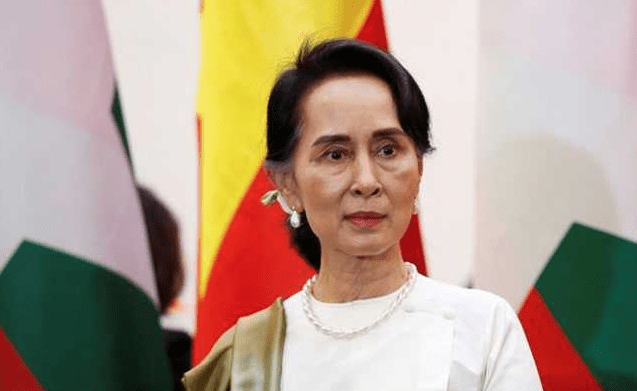Myanmar’s ousted leader Aung San Suu Kyi has been sentenced to two years in prison, the first in a series of verdicts that could see her sentenced to life in prison.
Suu Kyi was found guilty on charges of inciting dissent and breaking the rules to prevent covid-19 during the 2020 election campaign.
“She was sentenced to two years in prison under section 505(b) and two years in prison under the natural disaster law,” Zaw Min Tun, a spokesman for the military junta that currently rules Myanmar, told the AFP news agency.
The sentence was cut in half shortly after, when the head of the military junta, Min Aung Hlaing, “pardoned” part of the sentence.
Min Tun said that Suu Kyi will face trial for the other charges she is accused of from where she is now.
The ousted leader has 11 charges against her, but has denied all the accusations.
Amnesty International said Monday that Myanmar’s military junta is trying to “stifle freedoms” by sentencing Suu Kyi.
“The harsh sentences handed down against Aung San Suu Kyi on these trumped-up charges are the latest example of the army’s determination to eliminate all opposition and stifle freedoms in Myanmar,” the group said in a statement quoted by AFP.
Military coup
The 76-year-old woman led an elected civilian government before it was ousted in a military coup in February.
The military took power alleging fraud in the general elections held in 2020 in which the National League for Democracy (NLD), led by Suu Kyi, won by an overwhelming majority.
Since then, Suu Kyi has been under house arrest, charged with a series of offences, including several counts of corruption, violation of the Official Secrets Act and inciting public disorder.
Little has been seen or heard of her other than her brief court appearances.
Who is Aung San Suu Kyi?
Aung San Suu Kyi is the daughter of General Aung San, Myanmar’s independence hero, who was assassinated when she was just 2 years old, just before the country gained independence from British colonial rule in 1948.
Suu Kyi was once seen as a beacon of human rights: an activist who gave up her freedom to defy the army generals who ruled Myanmar with a heavy hand for decades.
In 1991, she received the Nobel Peace Prize, while still under house arrest, and was hailed as “an outstanding example of the power of the powerless.” She spent nearly 15 years in detention for periods between 1989 and 2010.
In November 2015, he led the National League for Democracy to a landslide victory in Myanmar’s first contested election in 25 years.
The country’s constitution prohibits her from becoming president because she has children who are foreigners, but Suu Kyies is considered the de facto leader.
Since becoming Myanmar’s state councillor, her leadership has been defined by the treatment of the country’s mostly Muslim Rohingya minority.
At home, Suu Kyi remains very popular with the Buddhist majority who have little sympathy for the Rohingya.










